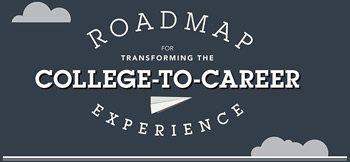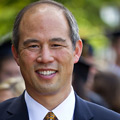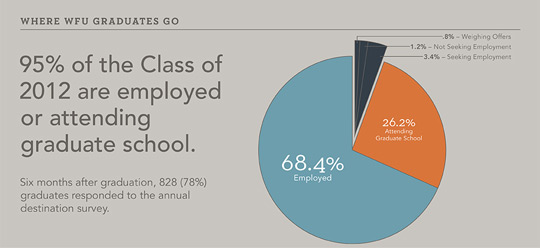A roadmap to success
In many ways, Courtney Flynn (’14) is the poster child for a 21st century liberal arts education.
A junior Classical studies major, she pursues her passions while simultaneously safeguarding her future with the help of Assistant Director of Career Education and Counseling Carolyn Couch.
“I believe that while primary the purpose of the institution is to teach us, it’s also to teach us things that are applicable to the rest of our lives,” said Flynn, who will intern with Citigroup this summer. “There are no Romans out there hiring and I don’t want to go to law school, which is the typical path afterwards. I declared my Classical studies major because I love it. For me, the career office is a vital link between what we learn and what we can do with it.”
Wake Forest has been at the forefront of transforming the traditional, outdated concept of “career services” into a holistic, four-year approach to personal and career development.
 Now, a new report issued by the Office of Personal and Career Development (OPCD), “A Roadmap for Transforming the College-To-Career Experience” outlines a seven-step process to help colleges and universities of all sizes and resources rethink the way they prepare students for the world of work.
Now, a new report issued by the Office of Personal and Career Development (OPCD), “A Roadmap for Transforming the College-To-Career Experience” outlines a seven-step process to help colleges and universities of all sizes and resources rethink the way they prepare students for the world of work.
This crowdsourced paper, which includes input from 20 innovators in higher education and business, also profiles and shares insights from some of the country’s leading personal and career development models in higher education.
Building upon the ideas of national thought leaders representing the professional world and from 74 premier colleges and universities, the report captures feedback from the “Rethinking Success” conference hosted by Wake Forest last year.
In addition to examining issues related to the value of a liberal arts education and employment today, the conference also helped catalyze a national movement with a clear takeaway and an urgent call-to-action.

Chan
“Career preparedness is not a talking point for graduation season only. Higher education as a whole must do more to prioritize personal and career development as a four-year long, mission-critical component of the college experience,” said Andy Chan, Wake Forest’s vice president for personal and career development. “To achieve a life of meaning and purpose, students need to be employable for life, not just employable immediately after graduation.”
Investing in personal and career development pays off
Four years ago, President Nathan Hatch envisioned an undergraduate experience that gave students not only an academic education, but also a career education that teaches them about themselves and their options in the world of work.
Since 2009, Chan has built an innovative, resourceful “College-to-Career” community designed to intentionally prepare students in a comprehensive way, starting with their first days on campus.
In three years, Wake Forest has raised more than $10 million to invest in personal and career development, and the results are paying off. Of the Class of 2012, 95 percent reported being employed or graduate school just six months out of college (compared to a 66 percent nationally).
Rethinking personal and professional success for students
To that end, it might seem surprising that, according to the National Association for Colleges and Employers, colleges and universities have slashed career office budgets by an average of 16 percent in the past year.
Though many schools – from large public research universities to traditional liberal arts colleges – face real resource constraint issues, they cannot be an excuse for not providing the necessary career support for every student, says Chan. To that end, he outlines seven key steps institutions of all types should take to successfully enable and implement transformational change in the area of personal and career development.
“Unless we can demonstrate to current and prospective students and their families that the four years spent at college will result in real employment prospects, there will continue to be those who disparage a college education as a waste of time and money,” Chan said.
For students like Flynn, the OPCD experience isn’t just professional – it’s personal.
“I want to emphasize how office is invested in us as people. I have developed a relationship with my career counselor and she emails me all the time about events that would be of interest to me,” she said. “She’s also interested in how I am as a person and how things are at home. That’s the allure of the office. They’re interested in getting to know you and helping you.”
The full report and roadmap are available at http://opcd.wfu.edu.
Categories: Campus Life, Experiential Learning, Personal & Career Development, University Announcements
Media Contact
Wake Forest News
media@wfu.edu
336.758.5237




